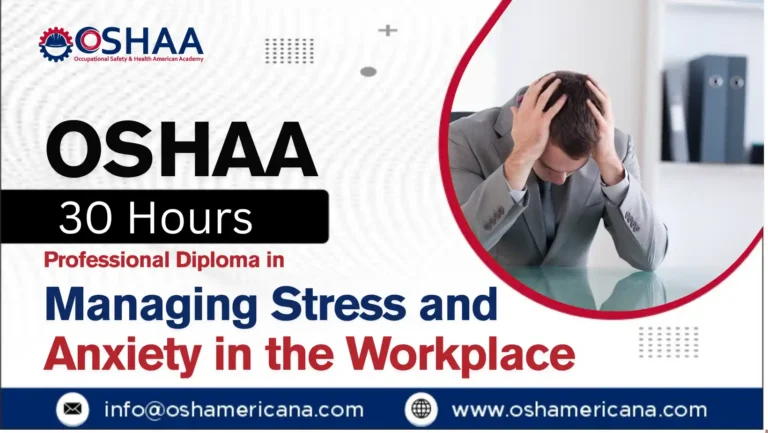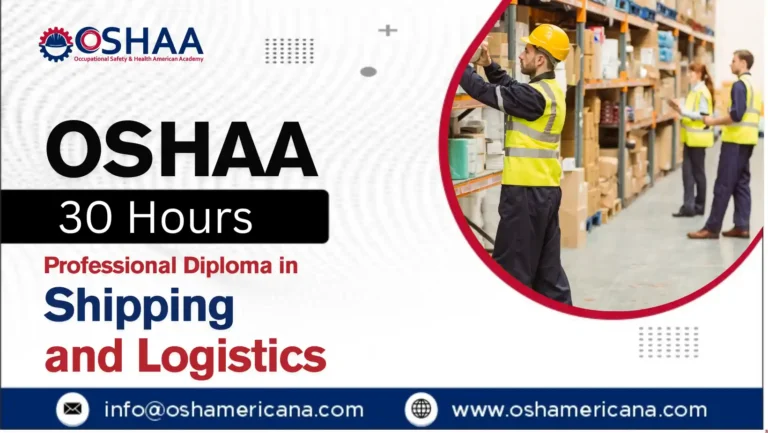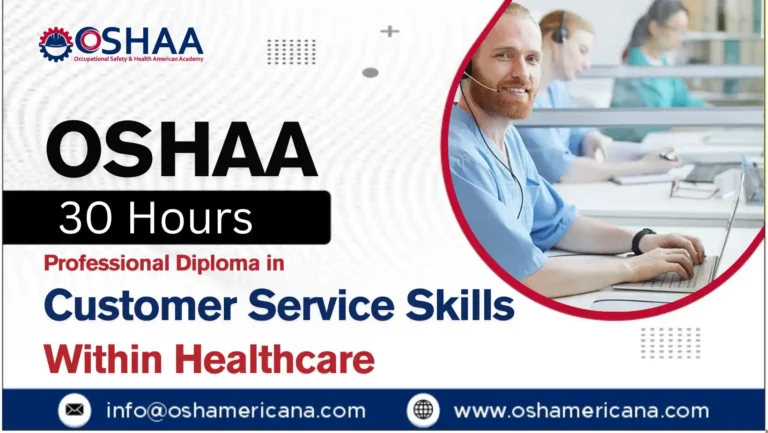Become a Certified Food Safety Leader with Serving Safe for Managers
The hospitality and service industry plays a crucial role in ensuring public safety, particularly in terms of food handling, customer service, and operational procedures. For managers in these industries, having a thorough understanding of safety standards and the ability to implement them effectively is key to maintaining high service quality and compliance with health and safety regulations.
The OSHAA 30-Hours Professional Diploma in Serving Safe for Managers is designed to provide individuals in managerial roles within the hospitality and service sectors with the necessary knowledge and skills to oversee safe practices in their establishments. This comprehensive course covers essential areas such as food safety, risk management, legal responsibilities, and emergency preparedness, all tailored to the specific needs of managers in service-oriented environments.
As a manager in a hospitality or service setting, you are responsible not only for the day-to-day operations but also for ensuring that your team adheres to health and safety standards. Whether you’re managing a restaurant, café, hotel, or catering service, your role involves overseeing the safe preparation, storage, and serving of food and drinks, as well as ensuring a safe working environment for employees and customers.
The OSHAA 30-Hours Professional Diploma in Serving Safe for Managers equips hospitality professionals with the essential knowledge and skills to ensure the safety and wellbeing of customers and staff. By completing this diploma, you will be better prepared to handle food safety challenges, comply with regulations, and create a culture of safety within your organisation. Whether you are a current manager or an aspiring leader in the hospitality sector, this course is the ideal way to advance your career and improve the quality of service in your establishment.
OSHAA 30-Hours Professional Diploma in Serving Safe for Managers
Study Units
Learning Outcomes
Introduction to Food Safety and Hygiene (3 Hours)
- Understand the fundamental principles of food safety and hygiene.
- Recognise the importance of personal hygiene for staff in maintaining safe food practices.
- Identify common foodborne illnesses and how to prevent them.
- Gain an understanding of the role of hygiene in reducing contamination risks in food service environments.
Risk Management and Safety Protocols (4 Hours)
- Learn how to identify and assess risks in food service operations.
- Develop skills in implementing effective risk management strategies to minimise hazards.
- Understand the importance of maintaining safety protocols for staff and customers.
- Create and review safety procedures that comply with industry standards and best practices.
Food Storage, Handling, and Temperature Control (4 Hours)
- Understand the best practices for storing food to prevent contamination.
- Learn the importance of temperature control in food safety, including safe cooking, cooling, and reheating methods.
- Gain knowledge of different storage techniques and how to maintain food quality and safety.
- Identify the proper handling procedures to minimise risks of cross-contamination.
Health and Safety Regulations in Hospitality (4 Hours)
- Familiarise yourself with UK health and safety regulations governing the hospitality industry.
- Understand the responsibilities of managers and staff in ensuring compliance with these regulations.
- Learn the legal requirements for food safety, hygiene, and overall workplace safety.
- Understand how to conduct regular safety audits and prepare for inspections.
Emergency Procedures and First Aid (4 Hours)
- Gain knowledge of essential emergency procedures in food service environments.
- Learn how to implement and communicate emergency plans effectively.
- Understand first aid procedures for common injuries and incidents in hospitality settings.
- Know how to respond to food safety emergencies, such as foodborne illness outbreaks or accidents.
Managing Customer Health and Allergies (4 Hours)
- Learn how to identify and manage food allergens in the food service environment.
- Understand the importance of clear communication with customers regarding allergens and dietary restrictions.
- Develop strategies for accommodating customer health needs safely and effectively.
- Gain insight into creating allergen management protocols for your establishment.
Training and Supervising Staff in Safety Practices (4 Hours)
- Learn how to effectively train staff on food safety and hygiene practices.
- Understand how to supervise staff to ensure compliance with safety standards.
- Gain skills in motivating and educating employees to adopt safe practices in the workplace.
- Develop methods for ongoing monitoring and support to maintain high safety standards.
Creating a Culture of Safety in the Workplace (3 Hours)
- Learn how to foster a culture of safety within your team and organisation.
- Understand the importance of leadership in promoting safety awareness.
- Develop strategies for engaging staff in safety initiatives and maintaining an ongoing focus on safety.
- Learn how to incorporate safety practices into everyday operations and ensure continuous improvement.
- Enhanced Knowledge of Food Safety and Hygiene
Gain a deep understanding of essential food safety principles, including hygiene practices, food storage, and handling techniques. This ensures you can maintain a safe environment for both staff and customers, meeting industry standards and regulations. - Improved Risk Management Skills
Learn how to effectively assess and manage risks in the workplace, reducing the likelihood of accidents or foodborne illnesses. By implementing appropriate safety protocols, you can safeguard your business and customers from potential hazards. - Compliance with UK Health and Safety Regulations
Stay up-to-date with the latest health and safety regulations that apply to the hospitality sector. This course helps you understand your legal responsibilities, ensuring that your business remains compliant with UK laws, reducing the risk of fines or legal issues. - Effective Emergency Preparedness
Acquire critical skills in emergency procedures and first aid, allowing you to handle potential incidents quickly and efficiently. You will be prepared to respond to food safety emergencies, health issues, or accidents in the workplace, ensuring the safety of both customers and employees. - Allergen Management Expertise
Learn how to manage food allergies and dietary restrictions, reducing the risk of allergic reactions in customers. Understanding allergen management allows you to better serve customers with specific health needs, improving satisfaction and safety. - Stronger Leadership in Safety Practices
Develop the ability to lead by example in promoting a culture of safety within your establishment. As a manager, you will learn how to train and supervise staff effectively, ensuring they adhere to safety practices and contribute to a safe working environment. - Reduction in Liability and Risks
By implementing strong safety measures and ensuring your staff is well-trained, you minimise the risks associated with food safety violations, accidents, and health concerns. This helps reduce potential liability and legal repercussions for your business. - Increased Customer Trust and Satisfaction
Establishing a safe and hygienic environment builds trust with customers. By ensuring food safety and allergen management, you can provide a more satisfying dining experience that prioritises the well-being of your customers. - Career Advancement Opportunities
Completing this diploma improves your qualifications, making you more competitive in the hospitality industry. It enhances your leadership skills and makes you a valuable asset in managerial positions, opening up new career opportunities in the service and hospitality sectors. - Boosted Operational Efficiency
Implementing food safety and risk management strategies improves overall efficiency in your operations. Streamlining processes and ensuring adherence to safety standards can result in smoother day-to-day operations, fewer disruptions, and a more productive workplace.
- Hospitality Managers
This course is ideal for managers in the hospitality industry, including restaurant managers, hotel managers, and catering supervisors, who are responsible for ensuring food safety, hygiene, and overall health standards in their establishments. - Aspiring Managers in the Hospitality Sector
Individuals looking to advance their career in hospitality management will benefit from this diploma by gaining the essential skills to oversee food safety and safety protocols, ensuring a smooth transition into managerial roles. - Catering and Food Service Professionals
Catering managers, food service managers, and those involved in large-scale food operations can enhance their knowledge of risk management, allergen safety, and health regulations, improving service delivery and compliance with industry standards. - Health and Safety Officers
Health and safety officers working in hospitality settings can use this course to deepen their understanding of food safety regulations, develop risk management strategies, and ensure compliance with local and national health standards. - Supervisors and Team Leaders
Supervisors and team leaders in foodservice establishments who are responsible for overseeing staff and maintaining food safety practices will gain valuable leadership and safety training skills to ensure their teams are properly trained and compliant. - Owners of Food-Related Businesses
Business owners in the foodservice or hospitality sector will benefit from this course to ensure they are up to date with the latest regulations, best practices, and procedures to keep their operations running safely and efficiently. - Food Safety Trainers
This course is beneficial for those responsible for training staff in food safety and hygiene practices. It provides the tools necessary to teach and reinforce the importance of maintaining a safe environment for both customers and employees. - Anyone Interested in Hospitality Management
Individuals looking to pursue a career in hospitality management will find this course an excellent foundation to start building their knowledge of food safety, customer health, and overall operational safety within the industry.







